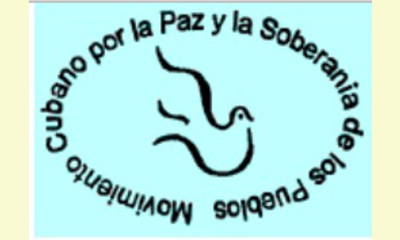|
|
Cuban movement for peace and sovereignty of peoples
un articulo por Georgina Camacho Leyva, Trabajadores. Órgano de la Central de Trabajadores de Cuba
An international seminar for the abolition of foreign
military bases and an inter-religious dialogue for
world peace, will be two of the activities that the
Cuban Movement for Peace and Sovereignty of the
Peoples (Movpaz) plans to develop this year with
support from other institutions. 
click on photo to enlarge
Many tasks lie ahead in their efforts to transmit and
instill a civic culture of peace, as evidenced in the
recently concluded survey of the institution's
activities.
The Pedagogy 2015 meeting will be held in Havana
from 26 to 30 January. It will be the Latin American
and Caribbean Forum as a peace zone and will
discuss the causes of confrontations in the area.
Silvio Platero, president of the Movement,
announced to attendees including peace activists,
journalists and members of other institutions, the
celebration of the annual edition of the competition
"Children paint for peace", in conjunction with the
awards of the José Martí Pioneer Organization
pioneers, that coincides with the International Day of
Peace on September 21. He also announced the tour
of the Cuban provinces of an exhibition of
allegorical posters for peace and against war, with
the collaboration of the Cuban Association of Social
Communicators.
They also recalled the 65th anniversary of the
founding of the organization, whose priorities remain
the complaint of the blockade against Cuba, and the
international struggle for the return of three of the
Cuban Five (Gerardo Hernández, Antonio Guerrero
and Ramón Labañino) unjustly imprisoned in the
United States until last December 17.
Among the many tasks with the aim of promoting
peace, the Cuban Movement continues to advocate
for the elimination of nuclear weapons and general
disarmament.
(Click here for a Spanish version of this article)
|








|
DISCUSSION
Pregunta(s) relacionada(s) al artículo :
Can we abolish all nuclear weapons?,
* * * * *
Comentario más reciente:
'THE WORLD IS OVER-ARMED AND PEACE IS UNDER-FUNDED'
30 August 2012 — The following opinion piece by Secretary-General BAN Ki-moon has appeared in leading newspapers in Argentina, Bangladesh, Burundi, China, Germany, India, Iran, Italy, Japan, Lebanon, Malaysia, The Philippines, Republic of Korea, Russia, Serbia, Turkey, Ukraine and European weekly publications and has been translated into 10 languages.
Last month, competing interests prevented agreement on a much-needed treaty that would have reduced the appalling human cost of the poorly regulated international arms trade. Meanwhile, nuclear disarmament efforts remain stalled, despite strong and growing global popular sentiment in support of this cause.
The failure of these negotiations and this month's anniversaries of the atomic bombings at Hiroshima and Nagasaki provide a good opportunity to explore what has gone wrong, why disarmament and arms control have proven so difficult to achieve, and how the world community can get back on track towards these vitally important goals.
Many defence establishments now recognize that security means far more than protecting borders. Grave security concerns can arise as a result of demographic trends, chronic poverty, economic inequality, environmental degradation, pandemic diseases, organized crime, repressive governance and other developments no state can control alone. Arms can't address such concerns.
Yet there has been a troubling lag between recognizing these new security challenges, and launching new policies to address them. National budget priorities still tend to reflect the old paradigms. Massive military spending and new investments in modernizing nuclear weapons have left the world over-armed -- and peace under-funded.
Last year, global military spending reportedly exceeded $1.7 trillion – more than $4.6 billion a day, which alone is almost twice the UN's budget for an entire year. This largesse includes billions more for modernizing nuclear arsenals decades into the future.
This level of military spending is hard to explain in a post-Cold War world and amidst a global financial crisis. Economists would call this an "opportunity cost". . ... continuación.

|
|









